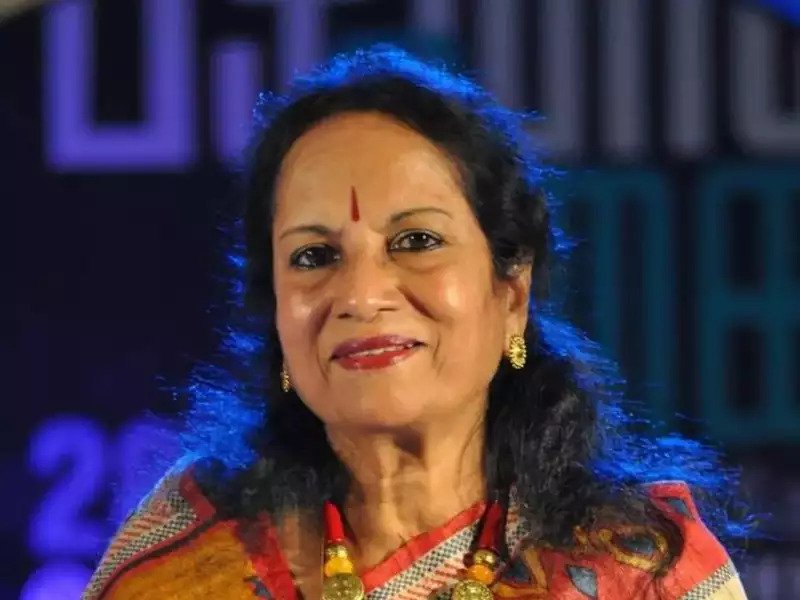
Vani Jairam: A versatile singer who deserved more than what she got

Back in 2018, during Chennai’s famed December music season, at one of the popular sabha’s in T. Nagar, the artistes announced mid-concert that they are elated and honoured to perform in front of the legend Vani Jairam, who was seated in the front row. There was thundering applause. Post-concert, I sneaked by to the front of the hall and greeted her. The warmth she exuded felt like meeting a grand old lady from the family after many years.
As news trickles in of her passing, earlier in the day, one tends to look back at her career spanning over five decades and the list of immortal songs that she breathed life into. Considered a child prodigy, who could reproduce even the orchestration of the songs she heard on the Radio, her move to Mumbai post-wedding was a blessing in disguise. Her husband Jairam who was a pillar of support through her career persuaded her to learn Hindustani Classical music under the tutelage of Ustad Abdul Rehman Khan and then there was no looking back. Vani’s big break came when she met Vasant Desai, at the recommendation of her guru, who recorded her along with Pandit Kumar Gandharva for Runanubandhachya for his Marathi album. Vani has mentioned in many of her interviews that she starts her day paying respects to the photo of Desai along with her parents and favourite deities.
Also read: Vani Jairam on ‘Guddi’, leaving Hindi cinema, and not singing at weddings
Stupendous success of Guddi
Desai also gave her Hum Ko Mann Ki Shakti and Bole Re Papihara in Guddi (Composer – Desai) which made her a household name. The latter was on top of the charts aired by Radio Ceylon for 16 continuous weeks. Despite the stupendous success of Guddi and its soundtrack, she never climbed the heights she should have. The number of songs she recorded in Hindi films pales in comparison to what she eventually recorded in other languages. She credited her parents and her mentor, Desai, for having instilled in her the maturity to tide over the struggles and insecurities she faced in the Hindi film industry.
It wasn’t until 1975, that she got her first major recognition in the form of a National Award for Apoorva Raagangal (Composer – MS Viswanathan). Yezhu Swarangalukkul became a rage. She went on to win the coveted award a couple of more times, once for Sankarabharanam (1980) and Swathi Kiranam (1991), both under the baton of KV Mahadevan. Ironically, both films were directed by K Viswanath, who breathed his last a couple of days ago.
Also read: Legendary singer Vani Jairam passes away
The Hindi film industry’s loss was the south’s gain. By the time Sankarabharanam was released, she was already a sought-after singer in all the south Indian languages. She and SP Balasubrahmanyam were the heart and soul of the film and went on to rewrite the idioms of classical music usage in cinema. If it was MS Viswanathan and Ilaiyaraaja in Tamil, it was MK Arjunan and Dakshinamoorthy in Malayalam, Vijayabhaskar, M Ranga Rao and GK Venkatesh in Kannada and KV Mahadevan in Telugu, among others, that gave her some of her best songs. It is a credit to her versatility and longevity that she remained relevant even into her late 70s. Composer D Imman, in his tribute, recalls having recorded her in August 2022 for one of his upcoming projects.
Also read: SP Balasubrahmanyam: The ‘singing moon’ has set
Her discography is too vast that it would do no justice to pick out a few songs. But for the uninitiated here are a few of my personal favourites, in no particular order.
Song: Ezhu Swarangalukkul (Movie – Apoorva Raagangal. Composer – MS Viswanathan)
Ennullil Engo (Rosapoo Ravikkaikaari – Ilaiyaraaja). Vani’s voice is the icing on the cake in this haunting melody
Narayana (Ramanujan – Ramesh Vinayakam). The pitch-perfect rendition at the age of 70 stands as testimony to her longevity
Ore Naal (Ilamai Oonjalaadukiradhu – Ilaiyaraaja)
Malligai En – (Dheega Sumangali – MS Viswanathan)
Sada Kannale – (Kavirathna Kalidasa – M Ranga Rao)
Mere To Giridhar Gopal (Meera – Pandit Ravi Shankar). Lata Mangeshkar’s and MS Subbulakshmi’s versions of this song may be more popular. But Vani’s rendition, in the 1979 film on the saint-poet is magical.
Oru Prema Lekhanam (Thuramukham – MK Arjunan)
Olanjali Kuruvi (1983 – Gopi Sundar)
Aanathi Neeyara (Swathi Kiranam – KV Mahadevan)
Brochevarevarura, Dorakuna and Maanasa Sancharare (Sankarabharanam– KV Mahadevan)
Also read: KK’s silken voice worked well for ‘kuthu’, disco and melancholic love songs
End of an era
I am only scratching the surface. There are many many more out there for every mood. Versatility was her middle name. She was at ease delivering a disco song (Vaa Vaa Pakkam Vaa for instance, from Thanga Magan) or an explosive dance number (Kavithai Kelungal – Punnagai Mannan).
The Government of India very recently honoured her with the Padma Bhushan, the third-highest civilian award. But one feels these recognitions and accolades came pretty late and few and far between, for a singer who sometimes doesn’t get mentioned in the same breath as some of her more decorated contemporaries. This is despite having sang over 10,000 songs in 19 languages with some of the greatest composers in the country.
Her passing marks the end of a prolific era in the history of Indian music. Vani breathed her last at her Chennai residence at the age of 77, on Saturday (February 4).
(The author is a part-time music journalist based in Bengaluru)

